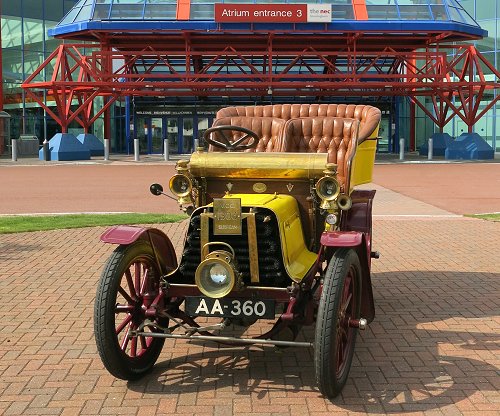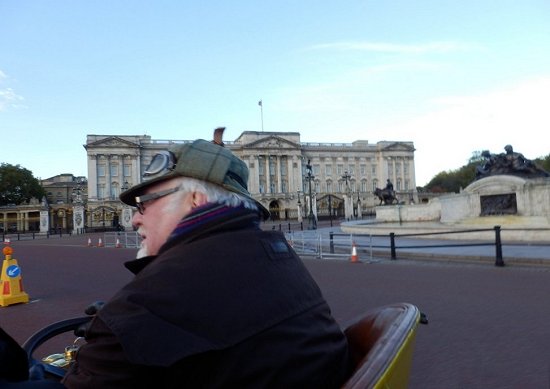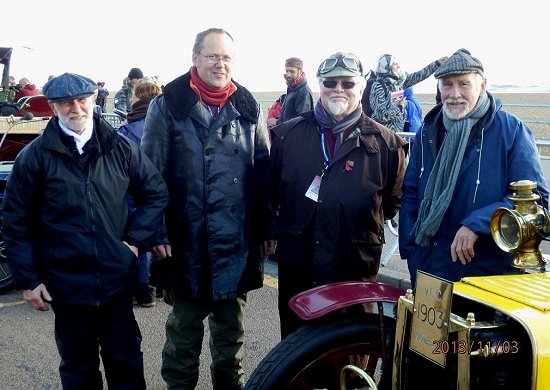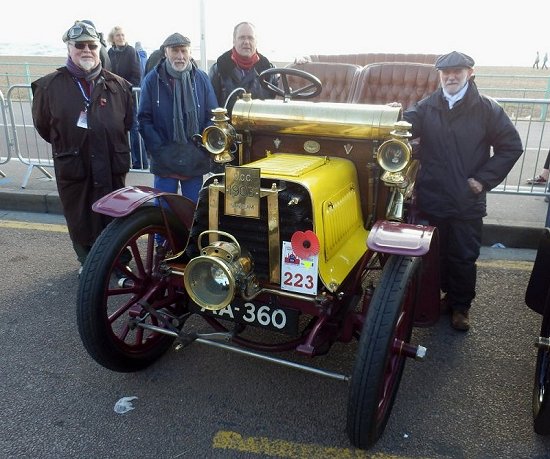The
2013 London to Brighton Run
Myself and several members of the
Black Country Living Museum’s Vehicle Volunteer Group,
participated in the 2013 London to Brighton
Veteran Car Run,
on the Black Country Living Museum's 1903 Sunbeam 10/12 Tourer.
The prestigious event, which was held on 3rd November, is
organised by the Royal
Automobile Club, and is the world's longest-running vintage car
event. It first took place in 1896, and covers a 60 mile-long
course from Hyde Park in central London, to the seafront at
Brighton. The vintage run regularly attracts several hundred of
the finest examples of cars built before 1905, and is possibly
the world's greatest event that celebrates the early years of
motoring.
What follows is a report of our successful completion of the
course, during an interesting and challenging day. |
|

The Sunbeam car at the NEC, after
successfully completing a road trial. |
The members of the group participating in the car
were Brian Rollings, Ken Norton, Ray Salisbury, and Peter
Yates.
The back-up vehicle was driven by David Beere.
On Sunday morning we left our Hotel in West Sussex
at 4 am and arrived at Hyde Park at just after 5.30 am. After
the car was taken off the transport trailer, we attempted to
start the engine, which sadly failed.
Ken Norton and Ray
Salisbury quickly removed the Bonnet and proceeded to clean the
Sparking Plugs. |
|
The Carburettor was given a squirt of easy start
and she burst into life. The car was then driven to our starting
location in Section 9, at the side of the Serpentine, in good
time for the start. |
|
At 6 minutes before our start time, the marshall
told us to start up and be ready for the off, to our relief the
engine started without any problems.
We set off more or less on time, passing through
Marble Arch, past Buckingham Palace, and then over Westminster
Bridge, and out of London. The traffic was quite difficult and
it was stressful making sure that we had enough stopping
distance due the car’s relatively poor braking ability. |

Passing Buckingham Palace, shortly after
the start. |
|
The Sunbeam was running well at this stage, but had a
tendency for the clutch to be rather fierce. This became
progressively worse, and resulted in some kangaroo starts, which
amused the general public. The problem could have been resolved
by oiling the cone clutch, however it was decided that if this
was done we may have trouble ascending the two hills that would
come later in the run.
Just before the Crawley halfway point, we stopped
at a garage for fuel, by which time about half a tank had been
used. On reaching Crawley, we checked-in. The water was checked,
and about a litre was added. Luckily everything else was fine.
After this we started-off on the last part of the run. The car
climbed the two hills without any problem, with all of us on
board, also with no signs of the engine overheating. At the top
of Hammer Hill we were applauded by the crowd as we reached the
summit. This was pleasing as we expected that at least three of
us would have to walk up the hill.
About two miles after the
last climb, a screeching noise was coming from under the car,
after stopping it was found that the centre of the exhaust pipe
had separated from the silencer. Ray Salisbury dived under the
car and re-joined the two pipes, and we were soon on our way
again. About 15 minutes later there was a clattering noise
coming from the engine. We again stopped, the bonnet was
removed, and it was found that the guard over the timing gears
had come loose. The guard, which had been distorted, was
removed, and we were soon moving again.
After these two minor repairs, no further problems
occurred. We checked-in at Preston Park, and then proceeded onwards through Brighton. Just after the check-in, we missed a
turn and went slightly off course. A policeman came over to us,
and expressed his surprise that we had taken a wrong turn at
this stage of the event. He said “Stay in the bus lane, and it
will take to the sea front.” |
 |
The jubilant team at the end of the
run. Left to right:
Ray Salisbury, Peter Yates, Brian Rollings, and Ken
Norton. |
| The car on the seafront, surrounded by
the team, at the end of a job well done.
Left to right:
Brian Rollings, Ken Norton, Peter Yates, and Ray
Salisbury. |
 |
|
It was a tremendous feeling of excitement and
satisfaction as we passed under the finish banner, at 12.45 pm,
our time from the start being 5 hours 10 minutes, including a
stop of about 45 minutes.
Our special thanks
must go to the Black Country Living Museum for allowing us to
use the car, and their financial support. Also to the following
sponsors
The Marston Trust,
Autotek Lichfield Ltd, Bev Parker, the late David Evans,
Sylvia Rollings, and the members of the Black Country Living
Museum Vehicle Volunteer Group.
Also a special thanks
to David Beere, who supported us with the recovery vehicle.
|
 |
|
 |
|
 |
Return to the
previous page |
|
Return to the
contents |
|
Proceed to the
next page |
|